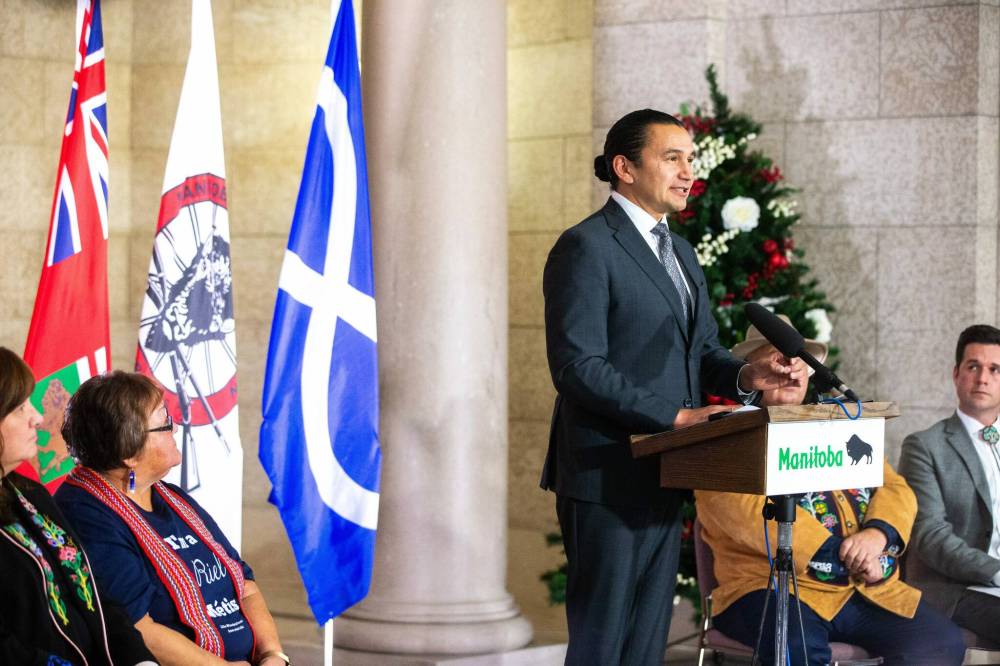Moving forwards on reconciliation
Advertisement
Read this article for free:
or
Already have an account? Log in here »
To continue reading, please subscribe:
Monthly Digital Subscription
$0 for the first 4 weeks*
- Enjoy unlimited reading on winnipegfreepress.com
- Read the E-Edition, our digital replica newspaper
- Access News Break, our award-winning app
- Play interactive puzzles
*No charge for 4 weeks then price increases to the regular rate of $19.00 plus GST every four weeks. Offer available to new and qualified returning subscribers only. Cancel any time.
Monthly Digital Subscription
$4.75/week*
- Enjoy unlimited reading on winnipegfreepress.com
- Read the E-Edition, our digital replica newspaper
- Access News Break, our award-winning app
- Play interactive puzzles
*Billed as $19 plus GST every four weeks. Cancel any time.
To continue reading, please subscribe:
Add Free Press access to your Brandon Sun subscription for only an additional
$1 for the first 4 weeks*
*Your next subscription payment will increase by $1.00 and you will be charged $16.99 plus GST for four weeks. After four weeks, your payment will increase to $23.99 plus GST every four weeks.
Read unlimited articles for free today:
or
Already have an account? Log in here »
Hey there, time traveller!
This article was published 04/12/2023 (720 days ago), so information in it may no longer be current.
November was a month of momentum for reconciliation in Manitoba.
Since being elected in October, the governing NDP and Premier Wab Kinew have wasted no time in prioritizing reconciliatory policies.
There are currently two bills before provincial lawmakers aimed at mending relationships with Indigenous communities that have been soured by historic and modern-day Canadian governments.

MIKAELA MACKENZIE / WINNIPEG FREE PRESS Files
Premier Wab Kinew announces the introduction of legislation naming Louis Riel as the honourary first premier of Manitoba Nov. 23.
One seeks to recognize Sept. 30 as a provincial statutory holiday to commemorate the National Day for Truth and Reconciliation. The other proposes naming Métis leader Louis Riel the honorary first premier of Manitoba.
Both pieces of legislation have been a long time coming and both represent a positive shift in the way Indigenous relations are approached at the provincial level. It’s a file with plenty of room for improvement, thanks to missteps made by previous Progressive Conservative governments.
Former premier Heather Stefanson repeatedly passed the buck on Orange Shirt Day.
First, she claimed months of consultations with business owners had yielded no consensus, despite community polling indicating majority support for the holiday. Then, she suggested Indigenous communities should be the ones to decide if Manitobans ought to be given a day off work to reflect on the painful legacy of Canada’s residential school system.
Reconciliation requires leadership, especially from those in positions of power. The actions and attitudes of elected officials can impact the actions and attitudes of their constituents.
While creating a new stat holiday might seem like a small gesture in the grand scheme of things, it sends an important message: that the stories of residential school survivors are worthy of pause, that the truth is deserving of reflection. After all, reconciliation is impossible without first acknowledging the truth of what occurred at these government-funded, church-led institutions.
It should not have taken this long and it should not have required the election of Manitoba’s first First Nation premier to arrive on the right side of history, but the province finally seems poised to add Orange Shirt Day to the official calendar. A small but meaningful milestone on the path toward reconciliation.
Recognizing Louis Riel as the province’s first premier is another such milestone. While the title is purely honorary, since the Métis leader never actually held the top office, it cements Riel’s rightful legacy as the founder of Manitoba.
The posthumous commemoration also helps correct the historical record, which, until fairly recently, described Riel as a treasonous traitor instead of as a visionary leader who fought to enshrine the right of Métis people and others others living in the Red River Settlement during Manitoba’s entry into Confederation.
If passed, the Louis Riel Act will ensure students learn an accurate account of his life and contribution — another meaningful commitment to truth.
The tribute to Riel is an act of reconciliation in more ways than one. In recent years, the relationship between the provincial government and Manitoba’s Métis community has been a notably tense one, with former Premier Brian Pallister and Manitoba Metis Federation president David Chartrand regularly squaring off over issues of land rights and government funding.
During his first two months in office, Premier Kinew has sought to make amends — both modern and historic — with the Métis Nation.
Reconciliation in Manitoba has and will continue to be a long and difficult process. But Mr. Kinew’s first steps have been positive and decisive.
History
Updated on Monday, December 4, 2023 11:00 AM CST: Wab Kinew is first First Nation premier not first indigenous premier



